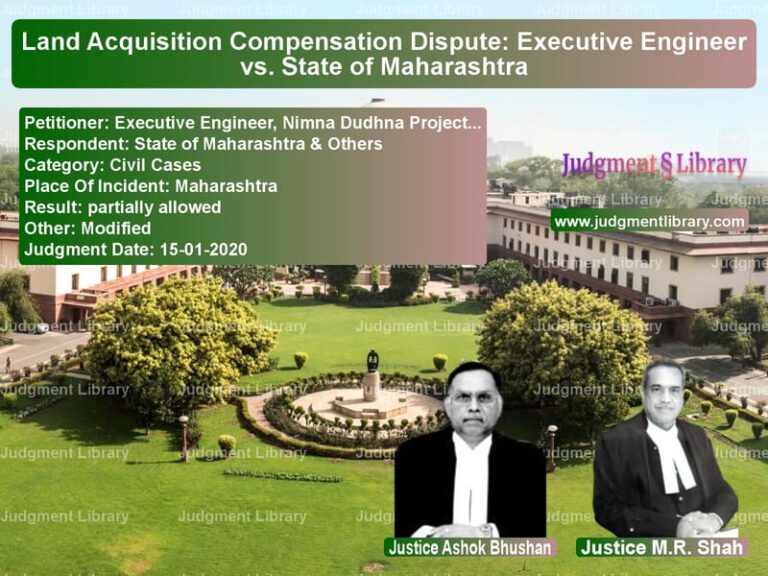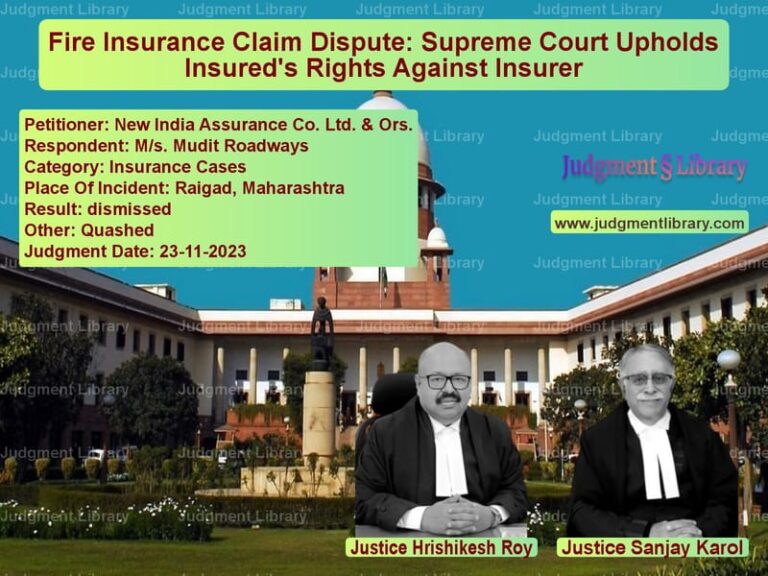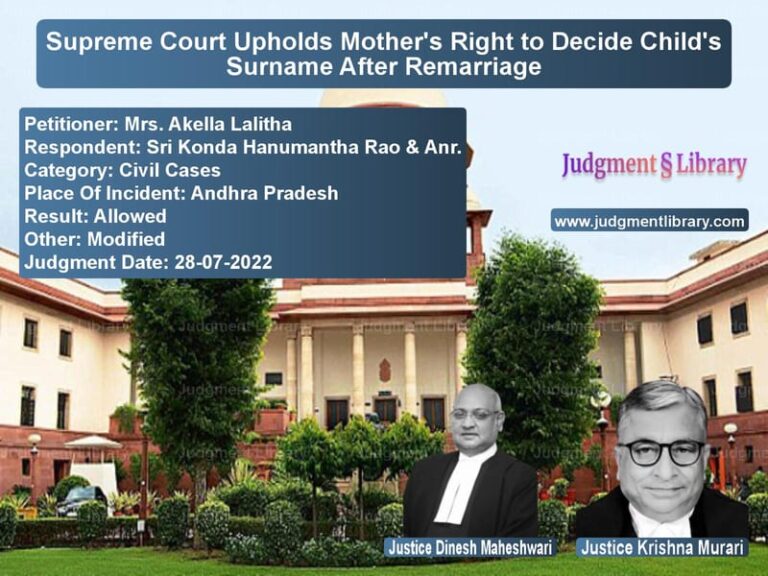Partition and Inheritance Rights: Supreme Court’s Landmark Judgment on Family Settlements and Succession
The case of Pharez John Abraham (Dead) By Lrs. v. Arul Jothi Sivasubramaniam K. & Others is a significant ruling on property disputes, inheritance rights, and the effect of conversion to another religion on succession claims. The Supreme Court analyzed the legal principles of succession under the Indian Succession Act, the validity of family settlements, and the statute of limitations in partition suits.
Background of the Case
The dispute arose following the death of John D. Abraham, who passed away intestate in 1964. His estate included a house and land that were inherited by his wife and four children. Among his children was Triza Kalyani John, who converted to Hinduism and married a Hindu man. It was alleged that at the time of her marriage, she relinquished her share in the estate in exchange for Rs. 50,000 and gold ornaments.
After her death in 1986, her husband and children (the plaintiffs) filed a partition suit in 1987, claiming her rightful share in the estate. The key issues before the courts included:
- Whether Triza Kalyani John had legally relinquished her share in the estate.
- Whether conversion to Hinduism affected her succession rights.
- Whether the plaintiffs’ claim was barred by limitation.
- The rights of other heirs, including adopted children, in claiming their shares.
The trial court dismissed the suit, holding that the plaintiffs had no claim since Triza Kalyani John had relinquished her rights, and the claim was time-barred. However, the High Court reversed this decision, ruling in favor of the plaintiffs and granting them a share in the property.
Petitioners’ Arguments
The petitioners, represented by their legal counsel, raised the following arguments:
- That Triza Kalyani John had voluntarily renounced her claim in exchange for Rs. 50,000 and gold ornaments at the time of her marriage.
- There was a family arrangement under which Triza Kalyani John’s claims had been settled.
- That the plaintiffs’ suit was barred by limitation as it was filed more than 20 years after John D. Abraham’s death.
- That the High Court erred in ignoring the family settlement and misinterpreted the legal position regarding partition and limitation.
Respondents’ Arguments
The respondents (plaintiffs), represented by their counsel, countered the petitioners’ claims:
- That there was no valid relinquishment deed executed by Triza Kalyani John.
- That under the Indian Succession Act, conversion to another religion does not affect inheritance rights.
- That the alleged payment of Rs. 50,000 and gold ornaments did not constitute a formal and legal relinquishment of property rights.
- That the High Court had correctly interpreted the law, and the petitioners’ objections were legally untenable.
Supreme Court’s Observations
The Supreme Court analyzed whether the High Court had erred in granting partition and whether the claim was barred by limitation. The key findings were:
- There was no legally valid and registered relinquishment deed to prove that Triza Kalyani John had given up her inheritance rights.
- Under the Indian Succession Act, an individual’s conversion to another religion does not bar them from inheriting property.
- The partition claim was legally valid as per succession laws, but adjustments had to be made based on the actual shares in the estate.
- Adopted children were also entitled to a share in the property.
Final Judgment
The Supreme Court ruled partially in favor of the petitioners. It modified the High Court’s order and directed that the property be divided into three equal shares among the rightful heirs. The key directives of the Court were:
- The claim of the plaintiffs was dismissed due to the lack of sufficient evidence proving their entitlement.
- The High Court’s order granting them one-fourth share was overturned.
- It was held that the rightful division of property should be:
- Original defendant No. 2 (Pharez John Abraham) was entitled to one-third share.
- Defendant No. 3 (another legal heir) was entitled to one-third share.
- Defendants No. 4 and 5 (joint heirs of another legal heir) were jointly entitled to one-third share.
- The partition decree was to be implemented in accordance with the revised division.
Impact of the Judgment
This ruling clarifies several important aspects of property law and succession:
- A family settlement must be legally documented to be enforceable.
- Conversion to another religion does not automatically disqualify an heir from succession rights.
- The statute of limitations applies strictly in partition suits.
- Adopted children are entitled to an equal share in inherited property.
Conclusion
The Supreme Court’s decision in this case provides significant clarity on succession and partition disputes. It emphasizes the importance of legally documented family arrangements and affirms that succession rights are protected irrespective of religious conversion. The judgment also ensures that partition claims are subject to legal scrutiny and must be filed within the prescribed time limit.
Petitioner Name: Pharez John Abraham (Dead) By Lrs..Respondent Name: Arul Jothi Sivasubramaniam K. & Others.Judgment By: Justice L. Nageswara Rao, Justice M.R. Shah.Place Of Incident: Bangalore, Karnataka.Judgment Date: 02-07-2019.
Don’t miss out on the full details! Download the complete judgment in PDF format below and gain valuable insights instantly!
Download Judgment: Pharez John Abraham vs Arul Jothi Sivasubra Supreme Court of India Judgment Dated 02-07-2019.pdf
Direct Downlaod Judgment: Direct downlaod this Judgment
See all petitions in Property Disputes
See all petitions in Succession and Wills
See all petitions in Judgment by L. Nageswara Rao
See all petitions in Judgment by Mukeshkumar Rasikbhai Shah
See all petitions in partially allowed
See all petitions in Modified
See all petitions in supreme court of India judgments July 2019
See all petitions in 2019 judgments
See all posts in Civil Cases Category
See all allowed petitions in Civil Cases Category
See all Dismissed petitions in Civil Cases Category
See all partially allowed petitions in Civil Cases Category







